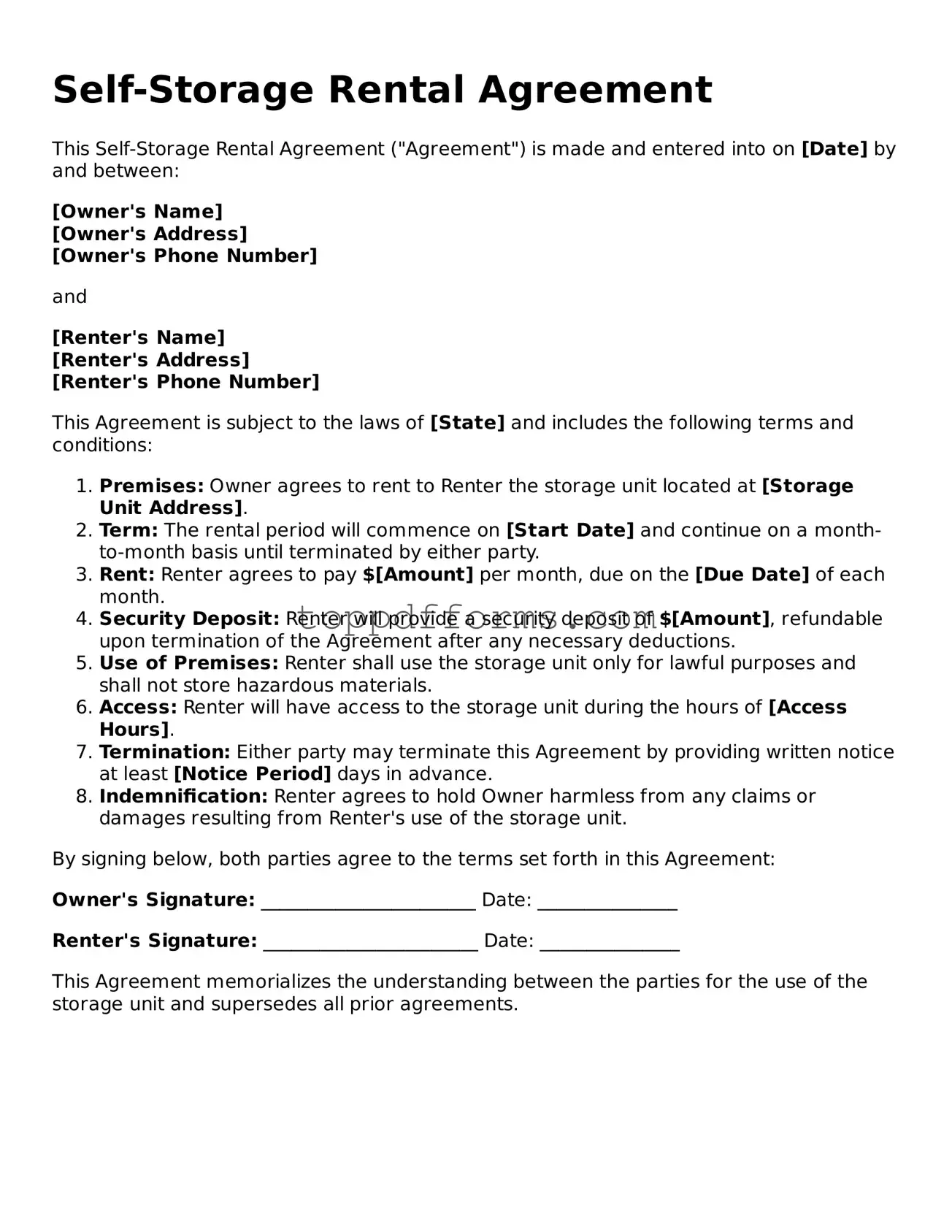Free Self-Storage Rental Agreement Template
Things You Should Know About This Form
What is a Self-Storage Rental Agreement?
A Self-Storage Rental Agreement is a legal document that outlines the terms and conditions under which a customer rents a storage unit from a facility. This agreement typically includes details such as the rental period, payment terms, access rights, and responsibilities of both the renter and the storage facility. It serves to protect the interests of both parties by clearly defining expectations and obligations.
What should I look for in a Self-Storage Rental Agreement?
When reviewing a Self-Storage Rental Agreement, pay attention to several key elements. First, examine the duration of the rental period and any renewal options. Next, look at the payment terms, including the amount due, payment methods accepted, and any late fees. Additionally, review the clauses regarding access to the unit, insurance requirements, and what happens in the event of non-payment. Understanding these aspects can help prevent misunderstandings later on.
Can I make changes to the Self-Storage Rental Agreement?
Changes to a Self-Storage Rental Agreement are generally not permitted without the consent of both parties. If you believe modifications are necessary, discuss them with the storage facility management. Any agreed-upon changes should be documented in writing and signed by both the renter and the facility to ensure clarity and enforceability.
What happens if I fail to pay my rent on time?
If a renter fails to pay rent on time, the storage facility may have the right to impose late fees as outlined in the agreement. Continued non-payment can lead to more serious consequences, such as the facility placing a lien on the stored items or initiating eviction proceedings. It is crucial to communicate with the facility if payment issues arise, as they may offer solutions or payment plans to avoid further complications.
PDF Overview
| Fact Name | Description |
|---|---|
| Purpose | A Self-Storage Rental Agreement outlines the terms between the storage facility and the renter. |
| Duration | The agreement specifies the rental period, which can be monthly or longer. |
| Payment Terms | Details on rental fees, due dates, and accepted payment methods are included. |
| Security Deposit | Many agreements require a security deposit to cover potential damages or unpaid fees. |
| Access Rights | It outlines when and how the renter can access their storage unit. |
| Governing Laws | Each state has specific laws governing storage agreements; for example, California follows the California Self-Service Storage Facility Act. |
| Liability Limitations | The agreement often includes clauses that limit the facility's liability for lost or damaged items. |
| Termination Conditions | Conditions under which either party can terminate the agreement are clearly defined. |
Common mistakes
Filling out a Self-Storage Rental Agreement can seem straightforward, but many individuals make critical errors that can lead to confusion or disputes later on. One common mistake is failing to read the entire agreement before signing. People often skim through the document, missing important clauses that outline their rights and responsibilities. This oversight can result in unexpected fees or restrictions on access to their belongings.
Another frequent error involves incorrect personal information. When renters provide inaccurate names, addresses, or contact details, it complicates communication and can lead to issues with billing or notifications. Always double-check this information for accuracy. A simple typo can have significant consequences.
Some individuals neglect to specify the rental term. Whether it’s a month-to-month agreement or a longer commitment, clarity is essential. Without a defined term, misunderstandings about payment due dates and termination rights can arise. It's crucial to ensure that this detail is explicitly stated.
People also often overlook the importance of understanding payment terms. Renters may sign the agreement without fully grasping when payments are due or the penalties for late payments. This lack of awareness can lead to financial strain or even eviction from the storage unit.
In addition, renters sometimes fail to document the condition of the storage unit before moving in. Noting any pre-existing damage protects both the renter and the storage facility from liability. If issues arise later, having this documentation can provide essential evidence in disputes.
Another mistake is not inquiring about insurance options. Many renters assume their personal property is covered under their homeowner's or renter's insurance. However, this is not always the case. Understanding the coverage options available through the storage facility can save renters from significant losses.
Lastly, individuals may ignore the rules and regulations set forth by the storage facility. Each facility has its own set of guidelines regarding what can be stored, access hours, and maintenance responsibilities. Ignoring these rules can lead to penalties or even the loss of access to the rented space.
Different Types of Self-Storage Rental Agreement Templates:
Wedding Venue Contract Example - Outlines the venue's policy on event coordination assistance.
For those looking to create a comprehensive understanding of their rental arrangements, the use of a Lease Agreement form is highly recommended. This document not only delineates the rights and responsibilities of both landlords and tenants but also provides a framework to resolve potential conflicts. To facilitate this process, resources like My PDF Forms can be invaluable in ensuring clarity and compliance with legal standards.
Parking Agreement Template - Includes any rules or regulations for using the parking area.
